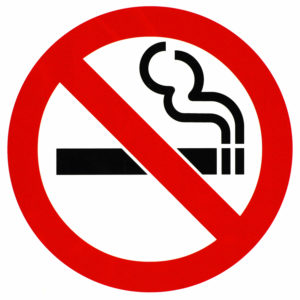Washington, D.C. became smoke-free on April 4, 2006. On that day a “health functions clarification amendment act” did what generations of muckrakers had failed to accomplish and got rid of the smoke-filled back rooms. Despite some initial grumbling, most bars and restaurants have adapted to the new, smoke-free environment. Now, after the District of Columbia voted to decriminalize recreational marijuana use, the question for many residents has become what kind of smoke they are free from.
The answer exposes a legal gray area. Washington’s smoking ban specifies that tobacco smoke is illegal, but says nothing about other materials. Under the language of the 2006 law, smoking “means the burning of a lighted cigar, cigarette, pipe, or any other matter or substance that contains tobacco.” It does not regulate smoking cannabis, which at the time remained illegal.
Then, in November 2014, Washington passed Initiative 71. This proposition decriminalized the use and possession of under two ounces of marijuana for those age 21 and older. In addition, the District police department website states that “a person can still be arrested for… smoking, eating, or drinking marijuana… in any public space.”
At the same time, the text of the law does not explicitly state that marijuana smoke will be treated the same as tobacco smoke under the indoor smoking ban. This may seem like a minor point, but for D.C.’s many renting residents, the slight distinction has an important effect. Some residents who thought they were moving into smoke-free apartments are now finding that their apartments smell like their neighbors pot habit.
The bulk of D.C. residents rent and most of these rent in buildings with multiple apartments. In 2015, a Census survey found that just under 60 percent of District residents rent and more than half of them live in buildings with more than three units. In a building like this, a complaint about cannabis smoke would fall to the building’s management to resolve. (While the city has an official office designated to tenant rights, it is primarily structured to protect renters from abuse at the hands of landlords.)
Residents began complaining of errant odors soon after decriminalization passed. In March, 2015, Mayor Muriel Bowser clarified that the same rules apply to smoking tobacco and cannabis indoors—namely it falls to the building to determine.
“It is up to apartment buildings and condo buildings to regulate their smoking policies,” said Bowser.
Generally these policies are part of the lease documents that residents sign before moving in. Since the measure was passed, many landlords have also amended their lease documents to clarify that marijuana is not allowed.
“Nothing in Initiative 71 prevents a landlord from prohibiting their tenants from growing or possessing legal amounts of marijuana,” the District of Columbia’s office of the attorney general said in a statement earlier this year.
However, it is difficult for a landlord to add clauses to a lease that has already been signed.
While some, including Joel Cohn, the legislative director of D.C.’s office of the tenant advocate, had argued that the change in the law shifts the presumptions of the lease. Rather than telling residents they could be evicted for illegal activity, for instance, the lease could potentially be amended to create penalties for smoking marijuana specifically.
“None of this has been decided by a court as yet,” Cohn said. “It probably will be.”
While Washington neighbors have sued each other over unwanted cigarette smoke, it is a drastic measure. The issue of smoking exposes a wrinkle in building rules—namely the problem of enforcement. Although building management may write rules to govern nuisances such as loud music, yelling, or smoking, for the most part, these rules are self-enforced. The process of escalating from a neighbor’s complaint to a resolution of the problem falls to the building itself.
For the moment, this places many buildings between a rock and a high place, so to speak. Despite the health risks of marijuana smoke, the city has yet to pass broad legislation to place pot smoke on the same footing as cigarettes. In the meantime, building management can do little more than explain to residents that they are in violation of the lease agreement and begin the long and difficult process of moving towards formal eviction.
The indoor smoking issue shows one of several areas where the District regulates marijuana less strictly than tobacco, which is ironic since cannabis remains a controlled substance. Another loophole of city law allows participants at marijuana rallies to offer samples to other supporters. Under the current law, the “transfer of up to one ounce of marijuana by adults 21 or older to another adult 21 or older” (i.e. one adult giving it to another) is legal. However, it is illegal to give away cigarettes in a public place or on private property open to the public.

